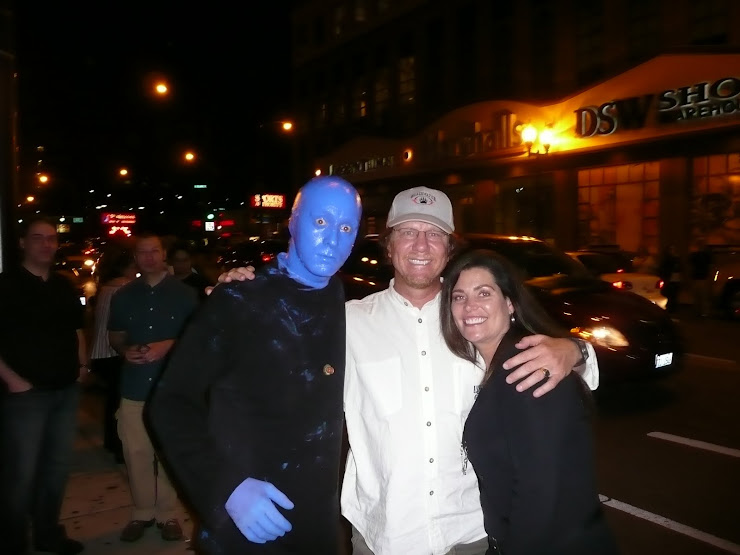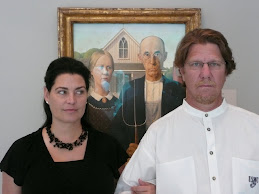On Monday, September 5th, myself and three other men from St. Michael’s Church set out for Bogalusa, LA to deliver three truckloads of Katrina relief supplies purchased and donated by our fellow parishioners.
It was a long and uneventful ride, and we saw very little storm damage until we were deep into Mississippi. (The wind and fury of the storm came ashore east of where we were driving south). I knew, of course, that the lack of Hugo-level wind destruction meant nothing-- the flooding is what crushed much of Louisiana, and it’s hard to imagine the economic impact of closing New Orleans for six months. Imagine, if you will, the state of South Carolina if everyone in the Tri-County Area was evacuated within a 12-hour period, and then none of us were allowed to return. Think of the thousands of businesses outside the Charleston Area that would fail.
When we arrived in Bogalusa on Tuesday afternoon, we found a town in fairly good shape, at least as seen through the eyes of folks who’d gone through Hugo: Yes, the place was banged up, but it wasn’t gone. We could tell immediately that the townspeople had worked hard the previous week, and although the residents appeared exhausted, they’d done a good job re-establishing some degree of normalcy. They’d cleared the main roads, and the power was on in lots of places-- we even saw one old guy mowing his lawn.
Now, please, don’t get me wrong, this area is badly hurt, and only the Lord knows the suffering that’s taking place there, but what we didn’t see was people who needed our supplies to actually survive, and we knew there were thousands of folks still fighting for their very lives in other areas.
In order to find a place were the need was critical, we went to the fire station to ask for advice. The fire fighters looked like they hadn’t slept in days, and told us they thought we were right to look for another spot to deliver the supplies. They didn’t have any suggestions, simply that we head further south towards Slidell, which had suffered massive flooding due to its bayou location. A conversation with the police didn’t yield much more.
So, south we went.
When we arrived in a tiny town called Pearl River, we found what we were hoping for: The Pearl River Church of the Nazarene, running a relief and supply station. Like many small town churches, the physical structures of the campus were unimpressive; in fact, it was hard to tell the parish hall from the sanctuary.
Located just outside Slidell, however, this was very close to the hardest hit areas in Louisiana, and we knew the tiny church would do a conscientious job of getting our food, medicine, chainsaws, and cash to the folks who needed it most.
As soon as we stopped we were met by several of their volunteers-- I guess there were around a dozen of them, as well as the pastor and the assistant pastor. Within 45 minutes, we’d unloaded the vehicles, and were preparing to launch back onto the road.
“How did you know we’d need chainsaws?” one volunteer asked.
“We came down from Charleston,” I said. “After Hugo, chainsaws became the background music of our lives.”
Before we left, we gave the Pastor a fairly significant wad of cash. When I told him how much it was, he struggled not to cry. We waited for him to compose himself, and finally he said simply, “I am so fortunate my Father is rich.”
I thought his comment was perfect, as he was giving thanks to the right place. Not to the donors, or the deliverymen, but to the God who entrusted us with that stuff in the first place.
On our way back through Mississippi, I thought back to the weeks following Hugo. If you weren’t in the Lowcountry then, all I can tell you is this: We worked like dogs. Sun-up to sundown, most of Charleston cut and hauled and cleaned and shoveled and packed and moved and labored like we were pioneers. It was something out of Little House on the Prairie, because the lack of electricity put everyone to bed shortly after sunset. As a general rule, you took care of your extended family first, and then helped the neighborhood you lived in. I gotta tell you, I get physically tired just thinking about it.
But something occurred to me as I rolled up that Mississippi Interstate and I thought about the volunteers manning that church relief station: If it had taken only one week to finish helping my family and neighborhood, you know what I would have done? I’ll tell you—I would have sat in the shade drinking Mt. Gay Rum and Orange Juice.
There is absolutely zero chance I would have carried my exhausted self into the church to help others. When that nightmare of labor and personal responsibility was over, all I could think was how studly it was that we’d pulled together as a family and a neighborhood and cleaned up our world, without so much as a whiff of FEMA or state assistance.
But, I soon realized, my pride in our accomplishments is actually pretty hollow. After all, even animals watch out for their family unit, and helping the folks who live on your block is no great sacrifice. If you don’t help them, they’ll drop a dime to the Property Owners Association about those clay lawn burros you brought back from Tijuana.
My point? Those church volunteers were locals, and they’d just gone through something every bit as bad as Hugo, and they were serving as volunteers at the church. It was 7:30pm when we left, and they were still there!
So, when someone asks me, “Why did God let Katrina hit? Where was He then?” I can say, “I don’t know why He let it hit, but I know where he was… I saw Him in Pearl River, Louisiana, turbo-charging an average group of small town locals to do great things. He was giving them the ability to focus on helping others, instead of on their own problems. He was giving them the energy to press on when everyone else was sitting in the shade resting. And He was re-opening the eyes of a Pastor and four guys from St. Michael’s as to how rich He really is.”
Prioleau Alexander was joined on the trip to Louisiana by Dan O’Hanley, Tyler Prescott, and Edward Thompson.
Wednesday, February 17, 2010
Subscribe to:
Post Comments (Atom)



No comments:
Post a Comment